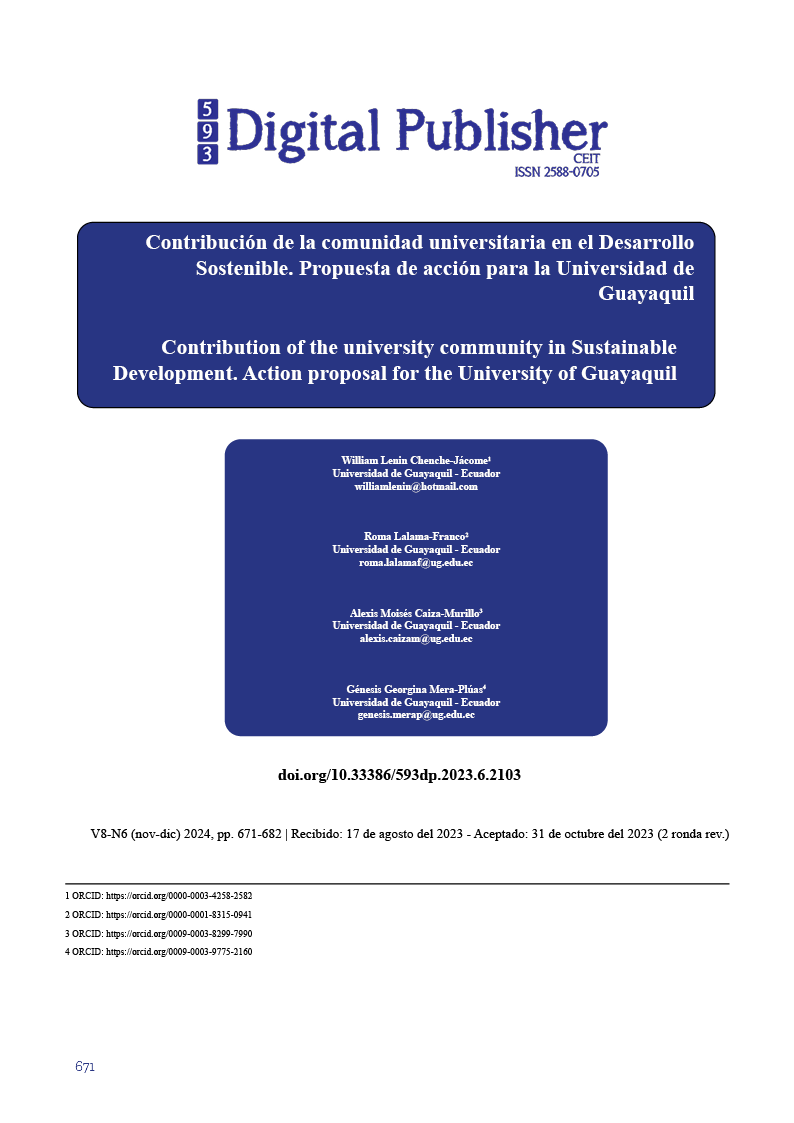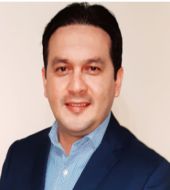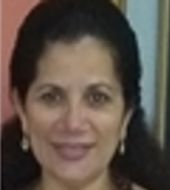Contribution of the university community in Sustainable Development. Action proposal for the University of Guayaquil
Main Article Content
Abstract
This study was formulated as an objective to generate an action proposal for the University of Guayaquil, which improves the contribution of the university community in Sustainable Development. The focus of this research was quantitative, carried out in two stages; the first is empirical, descriptive in scope, and the other is projective in scope. The population was 726 teachers and 9022 students enrolled in the University of Guayaquil, Faculty of Administrative Sciences, a simple random sampling was applied, obtaining a sample of 29 teachers and 198 students. For the first stage, data collection used the survey as a technique and two questionnaires as instruments, one for teachers and the other for students. The results showed that 48% of the students presented ignorance about sustainable development, 42% do not know the Development Plan and 47% do not know the objectives; similarly, 79% of teachers have no knowledge about them; however, 48% of them agree to receive training that helps provide feedback regarding sustainable local development and its objectives. Based on these results, the Action Proposal was generated, whose objective is to strengthen the participation of students and teachers towards sustainable development, through training and implementation of new subject in the curriculum. In conclusion, teachers will have the opportunity to be trained by being included in the annual planning, sustainable development programs, with various topics, which can be carried out twice a year.
Downloads
Article Details

This work is licensed under a Creative Commons Attribution-NonCommercial-ShareAlike 4.0 International License.
1. Derechos de autor
Las obras que se publican en 593 Digital Publisher CEIT están sujetas a los siguientes términos:
1.1. 593 Digital Publisher CEIT, conserva los derechos patrimoniales (copyright) de las obras publicadas, favorece y permite la reutilización de las mismas bajo la licencia Licencia Creative Commons 4.0 de Reconocimiento-NoComercial-CompartirIgual 4.0, por lo cual se pueden copiar, usar, difundir, transmitir y exponer públicamente, siempre que:
1.1.a. Se cite la autoría y fuente original de su publicación (revista, editorial, URL).
1.1.b. No se usen para fines comerciales u onerosos.
1.1.c. Se mencione la existencia y especificaciones de esta licencia de uso.
References
Asamblea Nacional del Ecuador. (2010). Ley Orgánica de Servicio Público. Registro Oficial Suplemento 294 de 06-oct.-2010. Presidencia del Ecuador.
Carson, R. (2010). Primavera silenciosa. Crítica.
Comisión Mundial del Medio Ambiente y del Desarrollo. (1988). Nuestro futuro Común. Alianza Editorial.
Garmendia, M., López De Armentia, T., Cubero, G., Pellejero, I., Solaberrieta, L., & Santos, F. (2021). Inserción curricular de enfoques y herramientas de la cooperación al desarrollo en la asignatura Abastecimiento y Saneamiento de Aguas del Grado en Ingeniería Civil. IN-RED 2021: VII Congreso de Innovación Edicativa y Docencia en Red. 1193-1206. València: Universitat Politècnica de València. https://doi.org/https://doi.org/10.4995/INRED2021.2021.13463
Gómez Gil, C. (2018). Objetivos de Desarrollo Sostenible (ODS): una revisión crítica. Papeles de relaciones ecosociales y cambio global, 140(1), 107-118.
Hernández, R., Fernandez, C., & Baptista, P. (2017). Metodologia de la investigación (sexta ed.). McGraw-Hill Interamericana.
Mousalli-Kayat, G. (2015). Métodos y Diseños de Investigación Cuantitativa.
Murray, R. S., & Larry, J. S. (2009). Estadística. 4ta edición. Mc Graw-Hill.
Naciones Unidas. (2015). Transformar nuestro mundo: la Agenda 2030 para el desarrollo sostenible. Resolución aprobada por la Asamblea general el 25 de septiembre de 2015. A/RES/70/1.
Pacheco-Peralta, N., Viteri-Chiriboga, E., Fuenzalida-Moreno, U., & Marchan-Rodríguez, F. (2022). El Modelo de Gestión y Responsabilidad Social Universitaria en cumplimiento de los Objetivos de Desarrollo Sostenible 2030. Polo del Conocimiento, 7(6), 1989-2001. https://doi.org/http://dx.doi.org/10.23857/pc.v7i6.4176
Ramos Torres, D. I. (2021). Contribución de la educación superior a los Objetivos de Desarrollo Sostenible desde la docencia. Revista española de educación comparada(37), 89-110. https://doi.org/10.5944/reec.37.2021.27763
Rieckmann, M. (2017). Educación para los Objetivos de Desarrollo Sostenible: objetivos de aprendizaje. UNESCO Publishing.
Schumacher, E. F. (2011). Lo pequeño es hermoso. Ediciones Akal.
Sen, A., & Kumar Sen, A. (2000). Desarrollo y libertad. Planeta.
Valencia-Cruzaty, L. E., Ayala-Bolaños, M., & González-Vásquez, A. E. (2021). Gestión del Conocimiento como estrategia para Asegurar la Calidad de la Educación Superior en Ecuador. Maestro y Sociedad, 18(3), 1230-1251.
Vogelfanger, A. D. (2021). La formación en derechos humanos y desarrollo sostenible de los docentes de educación primaria de la Ciudad de Buenos Aires. Revista de educación y derecho(1), 34-64.





